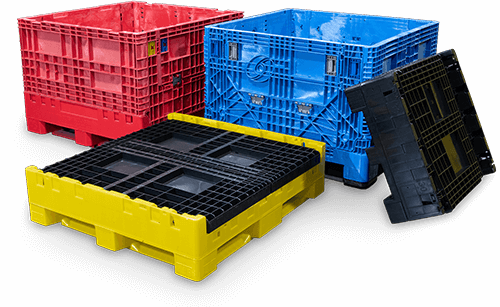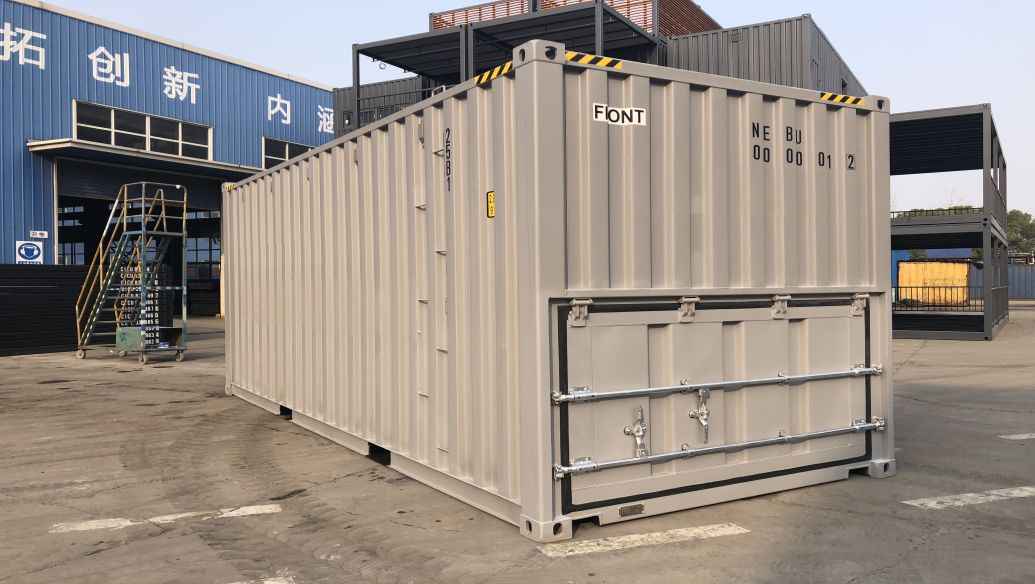Enhance your workspace efficiency using used collapsible containers for storage and delivery
Exactly How Mass Containers Can Enhance Efficiency in Your Product Packaging Workflow
Mass containers play a crucial duty in enhancing packaging operations. Their style enables much better use of upright area and promotes arranged supply management. This efficiency causes reduced material replenishment regularity and lower labor costs. In addition, the resilience of these containers reduces product damages. As businesses seek ways to improve their processes, understanding the complex advantages of bulk containers becomes crucial. What various other advantages might they bring to the table?
Structured Storage Space Solutions
As business look for to optimize their operations, structured storage remedies have come to be crucial for improving packaging effectiveness. Effective storage space not only conserves area yet likewise facilitates quicker access to materials, which is vital in busy manufacturing environments. Bulk containers, designed for easy piling and organization, substantially minimize the complexity of storage space systems. They allow organizations to maximize vertical room while decreasing the impact needed for inventory.
Furthermore, these containers frequently feature ergonomic styles that streamline taking care of and transportation, decreasing the danger of injury and boosting operations. By consolidating products in mass containers, companies can lower the frequency of restocking and improve their supply chain processes. On the whole, the implementation of effective storage remedies cultivates an extra orderly work area, bring about enhanced productivity and decreased functional prices. Through thoughtful design and tactical use of bulk containers, organizations can attain significant enhancements in their product packaging procedures.

Waste Decrease and Sustainability
While the search of performance commonly drives packaging choices, waste reduction and sustainability have actually arised as important considerations in contemporary procedures. Firms increasingly acknowledge that adopting mass containers can significantly lessen product waste. These containers often make use of much less product packaging material than conventional techniques, causing a smaller sized carbon footprint.
Mass containers can be recycled several times, which better lowers the need for single-use product packaging and reduces total waste going into landfills. Their layout usually permits for easier recycling processes, lining up with sustainability goals.
Furthermore, business that focus on waste reduction can boost their brand name reputation, attracting ecologically aware customers. By executing bulk containers, businesses not just improve operations however also contribute positively to environmental stewardship. This dual benefit of functional performance and sustainability placements firms favorably in a competitive market increasingly concentrated on eco-friendly techniques.
Improved Assembly Line Performance

Applying bulk containers on production line significantly enhances effectiveness by improving the handling and transport of products. By using bulk containers, manufacturers can lower the frequency of product replenishment, permitting employees to focus on setting up tasks instead of consistent stock monitoring. This causes less disturbances and a smoother process, inevitably improving performance.
Additionally, mass containers are made for easy combination with automated systems, additionally optimizing the setting up procedure. Their standardized sizes and Learn More forms help with far better organization, making it possible for workers to situate and gain access to products swiftly. This decrease in search time adds to a much more fluid production atmosphere.

Cost Financial Savings and Improved Revenue Margins
Significant cost financial savings can be recognized with the adoption of bulk containers in product packaging procedures. By reducing the need for several smaller sized packages, business can decrease product prices notably. Bulk containers often need much less packaging material generally, causing lower expenses on materials. In addition, the efficiency of mass handling minimizes labor costs related to packing and unpacking, even more boosting savings.
Fewer journeys to distributors and minimized transport expenses are also vital advantages, as mass containers enable boosted item capability per delivery. This greater quantity not just reduces delivery expenses but also enhances storage area within centers, causing boosted supply monitoring.
Additionally, the resilience of mass containers often translates to reduce damage prices throughout handling and transport, preserving product stability and lowering waste. Jointly, these elements add to enhanced earnings margins, making bulk containers an economically useful option for businesses seeking performance in their packaging operations.
Convenience Across Industries
Bulk containers use exceptional adaptability throughout different industries, making them an important asset past simply cost savings. In the food and drink sector, these containers facilitate the risk-free transportation and storage of big quantities of components, enhancing performance in production lines. In drugs, bulk containers ensure compliance with strict health standards while suiting the bulk handling of raw materials. The chemical market additionally benefits, as these containers endure rough compounds and prevent contamination, supporting risk-free procedures. used collapsible containers. Furthermore, the agricultural sector utilizes bulk containers for carrying fertilizers and grains, maximizing logistics and reducing waste. Their flexibility extends to production, where bulk containers enhance setting up processes and lower the requirement for too much packaging. This cross-industry functionality not just enhances operational performance but additionally promotes sustainability through lowered packaging waste, highlighting the integral role here are the findings mass containers play in modern-day supply chains
Often Asked Inquiries
Just How Do Mass Containers Effect Employee Safety in Product Packaging Operations?
Bulk containers greatly enhance staff member safety and security in packaging operations by decreasing manual handling, decreasing injury threats, and advertising ergonomic methods. Their design facilitates more secure transport and storage space, inevitably producing a more secure job environment for all employees.
What Products Are Bulk Containers Usually Made From?
Bulk containers are usually made from resilient materials such as high-density polyethylene, timber, steel, or polypropylene - used plastic containers. These products supply strength, resistance to ecological elements, and viability for different materials, guaranteeing secure and effective transportation of goods
Can Bulk Containers Be Personalized for Particular Products?
Yes, bulk containers can be customized for particular items. Suppliers commonly tailor measurements, products, and includes to meet distinct needs, guaranteeing suitable protection and effectiveness throughout storage and transport of numerous products.
Just How Do Bulk Containers Affect Transportation Logistics?
Mass containers enhance transport logistics by making best use of cargo space, minimizing the variety of journeys required, and lessening dealing with prices (used plastic containers). Their standardized measurements facilitate effective dumping and filling, ultimately leading to enhanced functional efficiency throughout the supply chain
What Is the Lifespan of Mass Containers in Routine Use?
The lifespan of mass containers in regular use generally ranges from five to 10 years, relying on material high find out here quality, dealing with methods, and environmental conditions. Correct upkeep can considerably extend their functionality and efficiency.
Implementing bulk containers on setting up lines considerably enhances efficiency by enhancing the handling and transport of products. Mass containers frequently require less product packaging material generally, resulting in reduced expenses on supplies. In pharmaceuticals, mass containers assure conformity with strict hygiene requirements while suiting the bulk handling of raw products. Their adaptability expands to production, where mass containers enhance setting up procedures and minimize the demand for too much product packaging. Bulk containers greatly boost worker safety in product packaging operations by decreasing manual handling, minimizing injury threats, and advertising ergonomic techniques.